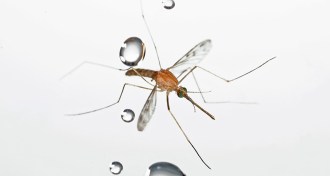News
-
 Space
SpaceSome newfound planets are something else
A re-evaluation of the Kepler mission’s data suggests one in three hot giant orbs it discovered is actually another kind of object.
By Nadia Drake -
 Health & Medicine
Health & MedicineReplacing fatty acids may fight MS
Patients are deficient in four key lipids that neutralize immune cells linked to inflammation and nerve damage.
By Nathan Seppa -
 Health & Medicine
Health & MedicineWhy antipsychotics need time to kick in
Insight into how some schizophrenia drugs work may explain why compounds that build up in the brain can take weeks to provide relief.
-
 Earth
EarthArctic’s wintry blanket can be warming
Forested snowscapes keep northern soils relatively toasty, diminishing how much climate-warming carbon they can sequester from the atmosphere.
By Janet Raloff -
 Animals
AnimalsHow a mosquito survives a raindrop hit
Lightweight insects can ride a water droplet, as long as they separate from it before hitting the ground.
By Susan Milius -
 Life
LifeAncient birds wiped out huge insects
Competition in the air trumped the advantage of extra atmospheric oxygen.
By Devin Powell -
 Life
LifeAntiaging protein helps set daily rhythms
Changing levels of sirtuin in the brain alter activity patterns in mice.
-
 Chemistry
ChemistryFlerovium and livermorium debut on periodic table
New element names honor the contributions of Russian and American laboratories.
-
 Humans
HumansStone Age art gets animated
Cave paintings and decorated disks provided moving experiences in ancient Europe.
By Bruce Bower -
 Physics
PhysicsQuantum teleportation leaps forward
Two teams report beaming information about particles over long distances, a step toward creating satellite quantum communication networks.
-
 Astronomy
AstronomyMilky Way will be hit head-on
The Andromeda galaxy is destined to slam directly into ours, new observations from the Hubble Space Telescope show.
-
 Genetics
GeneticsPoppies make more than opium
A 10-gene cluster controls the flowers’ production of a valuable cough suppressant and antitumor compound.